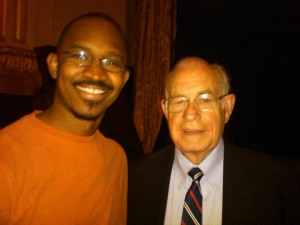If you you've ever attended a taping (which I highly recommend), you'd know that the actual production is not one hour plus breaks. It's more like 2 1/2 hours long! And just about every moment from the time that the house lights dim delivers.
Except for what you can gasp through peals of laughter, you won't breathe much.
After the the lights went down, the cast entered one at a time. Peter Sagal warmed up the crowd. Clearly he knows and loves the Bay Area; "Wait, Wait..." has played UC Berkeley's Zellerbach Hall about four times. And he knows that jokes about banning plastic bags and circumcision will induce the requisite response from this crowd. (Speaking of light bulbs, Paula Poundstone told a horrifyingly funny story from her San Francisco days, when she tried to remove a broken bulb from a live socket with needle-nose pliers.)
A few things were immediately striking when the actual taping began. First, the Opera House can produce dramatic, powerful sound, but the stage speakers were actually kept kind of low. I'm guessing it's to prevent feedback from the cast's microphones, and to force us to listen more and laugh just a wee bit less. If we're endlessly guffawing the whole time, that might slow things up...
Also, we quickly realized we were in for a lot more comedy than the average listener hears. You may be used to hearing a joke or two between answers, but they edit that down from about five minutes of inter-question banter. Peter, Paula, Faith, the other Peter and Biz were on a roll. One somewhat sexist joke told by Peter Sagal drew hisses from many women in the audience, but the panel ran with it and spun it into comedy gold.
And yes, they really are improvising. Sagal told me after the show that except for the questions and a few scripted elements, the vast majority of "Wait, Wait..." is off-the-cuff.
The biggest surprise: Biz Stone himself. He didn't seem particularly interesting at first, but he soon warmed up, revealing some things about Twitter that many of us did not know. According to Stone:
- He did not create the term "tweet." The users coined that term. Originally a message on Twitter was called a "twitter." And the verb was originally twittering" before users started "tweeting."
- 140 characters? That's because the international standard for text messages has a limit of 160 characters. Cutting tweets off at 140 ensures that one's entire message, plus the name of the user, can be seen in their entirety without having to "Click For More."
- Stone says he knew Twitter would work, despite disdain from everyone he knew, when he was at a tech conference in Texas. Some of the hardcore geeks who were trying the service out tweeted that they were assembling at a bar, and within minutes, it was packed.Soon after, the company was formed in San Francisco.
The show ended with a few "pickups": bits of dialogue that needed to be taped again for whatever reason (probably because we were laughing too hard in the background). Afterward, the house lights came up and Sagal took questions from the audience. He told us about a previous show in which a sign-language interpreter had to translate the phrase "crapped a pineapple" over and over (a Ronald Reagan reference that came up during a previous Zellerbach Hall show). One audience member asked if the producers would post the entire uncut show online, as a podcast.
"You know," Sagal said, "we get that request a lot."
Stagehands began clearing the stage as the cast signed autographs, posed for pictures and talked with the audience. Faith chatted with a few attendees, Paula smiled for a horde of fans, and both Peters commiserated downstage left. Carl Kasell told one fan he doesn't miss the morning newscast grind (and I, with my 3:30 am wake-up call, can empathize) but is still traveling to stations as an ambassador of sorts for NPR. It was nice to break the "fourth wall" and get close for some down-to-earth conversation.
"I'm in public radio," Sagal said after the show, looking understandably bushed. "If I start getting a big head, I'm in trouble."
What I saw astonished me in ways that the radio show cannot do justice. Next time they're in town, go. The crowd is diverse, but clearly die-hard listeners. The comedy is edgy, but not dirty. The tickets are coveted, but worth pursuing.
And seriously, you want to start that petition drive for an uncut "Wait, Wait..." podcast, let me know. I'll sign up.
